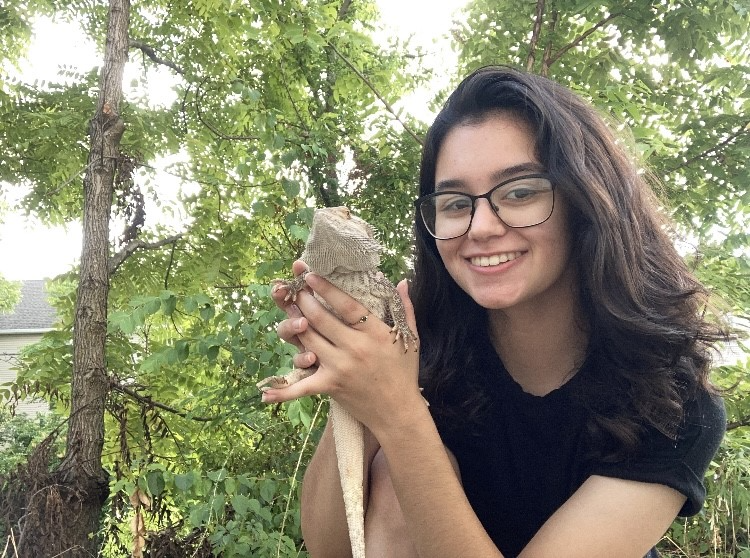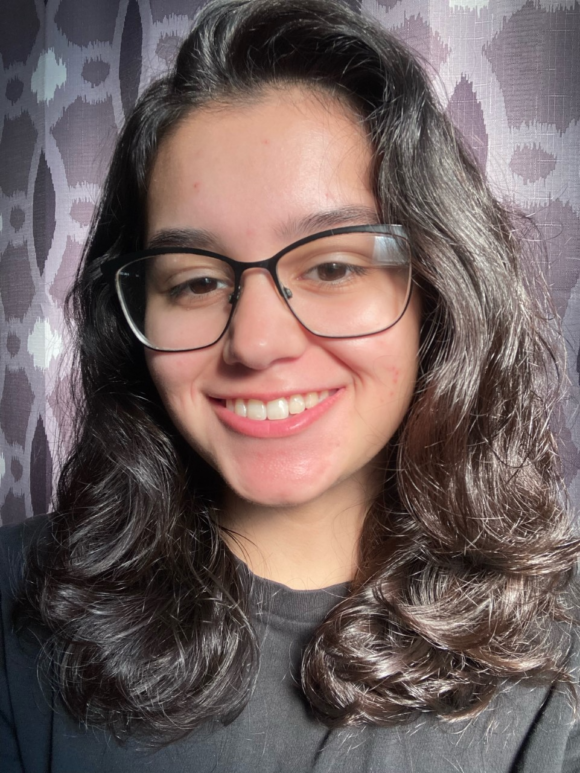
Leah Kapps (SEBS’26) with her pet lizard, a bearded dragon.
Leah Kapps, first-year student at Rutgers School of Environmental and Biological Sciences (SEBS), grew up in Kearny, New Jersey. She’s a first-generation student, who is excited about earning a degree from Rutgers and making her family proud.
A middle child, with two brothers, Leah lost her father when she was 10 years old. She feels she never really dealt with her grief until high school, a time in which she struggled with anxiety.
“I felt regret that I didn’t get to spend more time with him. I was devastated that he wasn’t going to be there for most of the important parts of my life. I also wished that I had grieved him sooner and I felt bad that I didn’t. There were many days that I thought maybe if I wished hard enough, he’d come back. It just didn’t feel real. He always believed in me and thought I would do great things, so I always think of him when I’m working towards my dreams and I think he would be proud.”
The start of “great things” for Leah is her dream of becoming a conservation biologist, a path that she feels is well set with her intended major, Ecology, Evolution, and Natural Resources.
Rutgers is the most “talked-about college” among Leah’s friends and high school cohort, so it felt natural for her to gravitate towards exploring undergraduate options here. Her first visit to Rutgers and SEBS, in particular, came when she was in the eighth grade, an experience she recalls quite vividly.
“On my first visit to Rutgers I got to ask marine biologists questions about their job. Then, I presented a science poster of research that I did with a group of people on arctic sea life. On that visit I thought it was really cool that a college had a farm on it. I was also impressed with all the high-tech equipment. This visit convinced me I had to have some sort of career in science.”

Leah Kapps, SEBS’26.
Her interest in science really took hold during her sophomore year at Kearny High School, when she joined the group, Students Against the Vanishing Earth (SAVE), later becoming president during her senior year. She also performed community service by helping to prepare the Kearny Community Garden for planting during the spring and summer between her junior and senior years of high school.
“I would love to somehow use science to help natural environments thrive and possibly make more people aware of things they can do to stop climate change.”
For her, it’s even beyond passion. It’s a lifestyle choice.
“I’m not just very passionate about environmental issues, I talk about it all the time. I try to make my friends and family more aware and make them more cautious about using plastics and things like that. I’ve become way more ecofriendly as it relates to products I use and the things I eat.”
Although just beginning her undergraduate experience at Rutgers, Leah has a pretty clear picture in her mind of what she’d like to do, in terms of a career.
“I want to focus more on how humans affect the natural environment and how I can help. One day I hope to be a conservation biologist, which is a career that involves a lot of fields, so it was important for me to choose a school that implemented that in its education.”
As Leah explored college options, she found SEBS to be “the only New Jersey college with an Ecology major,” which was among the reasons she chose it. She was drawn to the multiple hands-on learning experiences available in her intended major. In addition, she finds the physical environment of the Cook campus to be good for her mental health.
“Most schools offer environmental science as a possible major, but Ecology seemed like a better option since it’s more focused on natural settings and wild animals, while environmental science is more about saving humans from climate change. For me, having a lot of trees and greenery around also helps me mentally, like it does for a lot of people. I find it to be really calming compared to a city, and I’d rather hear birds than cars.”
Leah holds a distinct visual in her mind when she thinks about the kind of work she wishes to pursue and the future that she’s passionate about.
“I visualize myself going to different forests and other natural places frequently and doing some kind of research on how human actions are affecting other organisms and their environments. I usually think about observing land animals and plants over a period of time and protecting or helping their ecosystems.”

